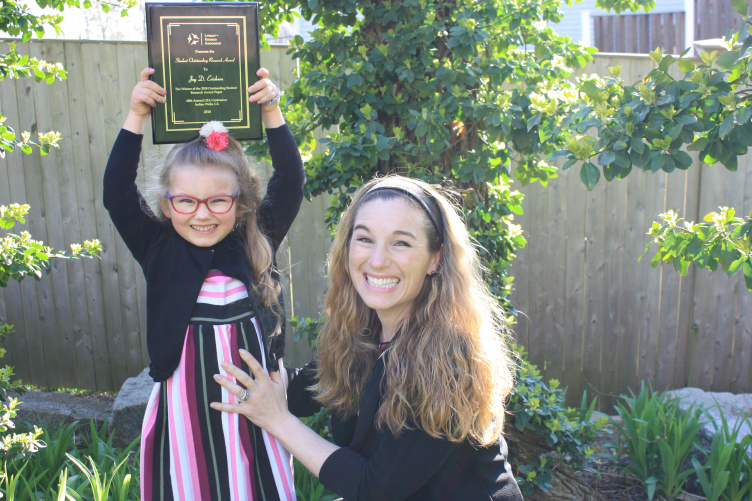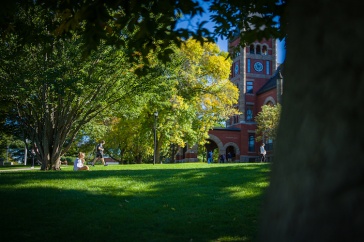
Joy Erickson '19G with her daughter Gabriella
It’s been a whirlwind year for doctoral candidate Joy Erickson.
Last spring, she was awarded a Dissertation Year Fellowship from the University of New Hampshire Graduate School.
Then, in November, she was named recipient of the 2018 Literacy Research Association (LRA) Student Outstanding Research Award for a conference paper that stemmed from her dissertation, making her the first UNH student to win the award — a great honor, as past award recipients include Peter Afflerbach and Debra Meyer, two greats in the field.
During the spring semester, she accepted a tenure-track assistant professor position at Springfield College.
But it all came to a close in May with commencement when she graduated with a doctorate in education. She couldn’t have done it without the community support, she says, especially her peers.
“My former UNH office-mate, peer and good friend professor Carla Evans once told me that it takes a village to write a dissertation. She wasn’t kidding,” Erickson says. “She demonstrated through her mentorship how to celebrate the high points of doctoral work and persevere through the low points … I can only hope that I came close to supporting and championing my peers as well as she did.”
Erickson is driven by her passion for literacy. Before pursuing her doctorate, she was a teacher, reading interventionist and reading specialist. She noticed there were some students reluctant to participate in reading intervention sessions. No matter her enthusiasm, she simply could not transfer her excitement to them.
“I wondered about the programs we were using. They were evidence-based programs, but they were evidence-based with respect to promoting foundational reading skills, not evidence-based with respect to supporting motivation,” she says. “And we’ve got a lot of data that suggests there’s a clear connection between motivation and reading development and achievement.”
The gap in research inspired her dissertation, which is about how reading interventions influence motivation for young readers in kindergarten through second grade. Not too surprisingly, she found that children who reported not enjoying the interventions were less engaged. The problem, as she saw it for the children in her sample, was rooted in a lack of autonomy.
“Several children said ‘I can’t read the books I want to read’ or ‘I don’t like most of the books here.’ Other children were bothered by the fact that the flow of intervention activities was strictly controlled. They’d start reading … and then the reading specialist would have them stop to do word work. Students didn’t like being interrupted while reading. They really wanted to finish the book,” Erickson says. “If we better support children’s motivation in intervention programs, then we should, in turn, be better supporting their reading achievement and development.”
Her next adventure is as a professor of literacy and language in Springfield College’s education department. She'd love to continue her research and bring it to a wider context so that teachers all over the country can better support their students. Along for the ride is her four-year-old daughter Gabriella, who insisted on traveling to California with her to see her receive her LRA award and who reminds her daily that children can express their opinions on matters that impact them, academically or otherwise.
“Gabriella is definitely a large part of the reason why I am so committed to better understanding young children’s perceptions of school reading programs,” Erickson says. “You need to be able to read, no matter what you go on to do. This project, for me, is about calling attention to young children’s understandings of school literacy programming in the hopes of laying a reading foundation that better enables them to go on and do whatever it is they choose to do.”
-
Written By:
Kelly Sennott | Grad School



















































